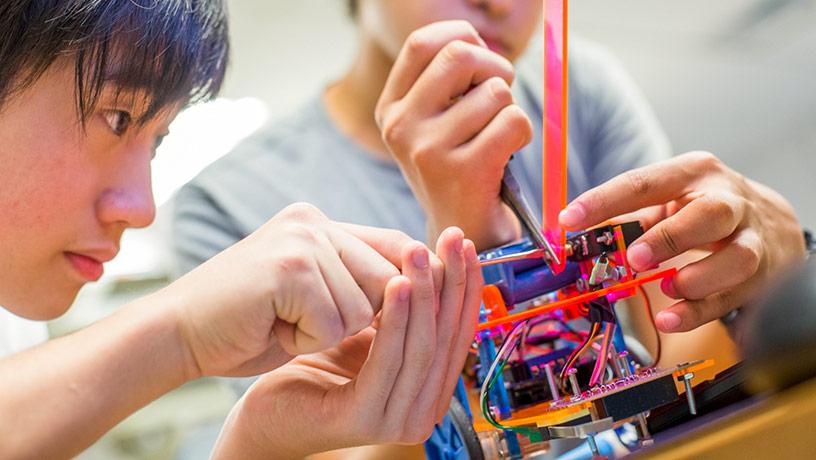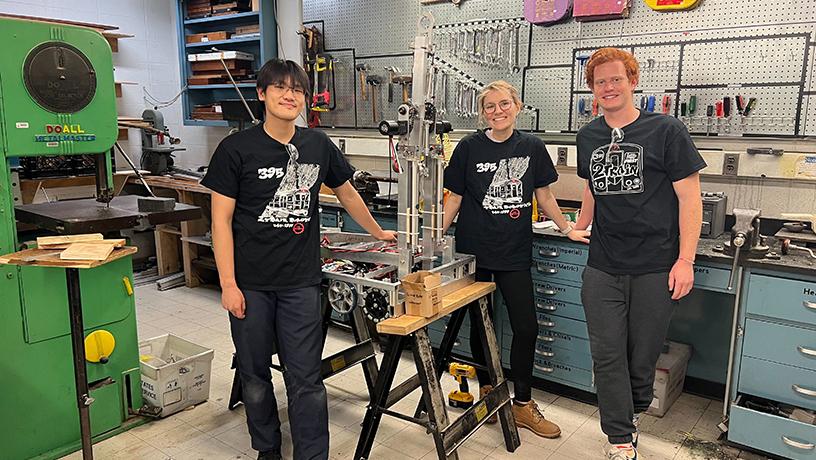Student robotics club mentors STEM champions
Columbia’s 2Train Robotics team has spent more than two decades training the next generation of award-winning roboticists

The Columbia-sponsored, student-run 2Train Robotics team takes high schoolers, some of whom have barely written a line of code or turned a wrench, and leads them to become champions. Getting there means building both know-how and confidence, and for the past two decades, Columbia Engineering students have passed those skills on to hundreds of these burgeoning engineers.
That transformation is even more incredible considering the team’s humble beginnings. 2Train Robotics started in 1999 as a collaboration between Gary Israel, a teacher at Morris Academy for Collaborative Studies in the Bronx, and Bob Stark, a manager of instructional labs in Columbia Engineering’s mechanical engineering department. Back then, Israel and Stark were looking for a way to engage young people in STEM through hands-on experiences, and they decided mentoring a new FIRST Robotics team would drive engagement. FIRST is a nationwide program designed to inspire young people to be science and technology leaders and innovators. At FIRST competitions, high-school teams program and build industrial-sized robots, which are judged on their ability to perform tasks, such as shooting balls into a basket or picking up and carrying large objects like a trash can.
Little did Stark and Israel know the growing partnership between Columbia Engineering and local high schools would soon become a model for how university mentors can uplift younger generations. Since the 2Train Robotics program started, the team has been named either winners or finalists in multiple east coast regionals over nine of the past 19 years, including in 2019 when the team won the Central New York Regional competition.
Fast forward to the present, and the team has taken on a renewed significance coming out of a pandemic-induced two-year hiatus from in-person competitions. Now the mission continues with more high-school students than ever from Columbia Secondary School participating as they prepare for the 2022 season. The team is now gearing up for the NYC Regional starting April 9.
As significant as this moment is for these high-school students, it’s also a major milestone for the multi-year college mentors out of Columbia. FIRST teams rely on these mentors to guide students in all aspects of designing, building, and programming their robots. As such, those involved with FIRST would tell you it’s just as much about inspiring the young competitors as it is about building cool robots.
We caught up with 2Train’s mentors—Columbia Engineering seniors Delphine Lepeintre BS’22, Simon Weisberg BS’22, and William Xie BS’22—to talk about how enriching the lives of young STEM students has changed their own perspectives.

William Xie BS’22, Delphine Lepeintre BS’22, and Simon Weisberg BS’22
Q. How did you get involved with 2Train Robotics?
Lepeintre: I first became involved with the FIRST Robotics Competition (FRC) when I was in high school, and the program was a large reason for why I went on to study engineering. When I learned Columbia was hosting a team, I instantly wanted to get involved. 2Train gives students the opportunity to engage with engineering in a hands-on way that most people don’t get until they are several years into college. I’ve been really happy to be a part of that these past four years.
Weisberg: I became involved with FRC when I joined Columbia. I transferred from Colgate University and always enjoyed volunteering with student groups whether it be SAT tutoring or teaching Chinese to local elementary students. My high school did not have a large robotics club, and I am really proud to be able to contribute to such an amazing hands-on learning experience for high school students.
Xie: In my senior year of high school, 2Train knocked my FRC team out of the quarterfinals of the 2018 NYC Regional. I went over to their team to wish them luck, and when I told one of their mentors that I’d be attending Columbia the following fall, he announced me to the team as “2Train’s new mentor.”
Q. What’s been the best part of mentoring for you?
Lepeintre: My favorite part of mentoring has been watching the students grow over the years. Many of the students have come from never having touched a power tool to now being pretty sophisticated machinists. I’ve also loved watching students become more involved in the design process as well. We have a couple of students on the team that are able to use computer-aided design software to design a robot mechanism on paper that later comes to life in the lab.
Weisberg: My favorite part of mentoring is also watching the progression of students as they grow and learn. Everyone has to start somewhere, and that often can be scary. It is incredible to see students who have not had any prior formal engineering training learn to become incredible designers, machinists, programmers, and all-around good people. FIRST is an incredible organization that fosters a very welcoming and wholesome environment that is really conducive to learning and growth.
Xie: Nothing compares to watching students you’ve closely worked with for years grow into skilled engineers, competent leaders, and compassionate teammates. To speak more specifically, nothing compares to strolling into the shop for a meeting and seeing that the veteran members have set an agenda, sorted tasks out and assigned groups of younger students to work with, leaving me alone with my homework.
What do you hope the students take away from being part of the team?
Lepentre: At 2Train, we really push our students to take initiative and learn how to learn. Unlike school, there is no neat lesson plan that teaches everything students need to know. Rather, students dive right into the engineering process. That means prototyping, failing, iterating on that design and researching new approaches to a problem. I hope students apply that to other aspects of their lives and see how much they are capable of doing.
Xie: I hope that students come away from 2Train with memories they can cherish and skills that will help them throughout their careers and lives. It’s great if they want to be software, electrical or mechanical engineers, but I like to think that we do a good job of teaching the generalizable core skills first and foremost, including communication, leadership, teamwork, empathy, curiosity and critical thinking.
Q. What’s your hope for the team’s future?
Weisberg: I am incredibly proud of the progress and development that the team has made even in spite of the many challenges that were posed in the past couple of years by the pandemic. I foresee that this team continues to grow and instill many more high schoolers with a sense of wonder and curiosity about engineering, robotics, and computer science.
Xie: This is 2Train’s 23rd year in operation. I hope that the team continues growing and taking in students from all over the city, giving them access to engineering, career, and peer resources and mentorship that might otherwise be unavailable to them, and I hope that we can keep facilitating that through the FIRST Robotics Competition. Working out of Columbia is a great privilege and opportunity for us and the high schoolers. It would be incredible if we could spend another 23 years doing our community this service.
Interested in learning more about robotics? Check out our summer program for high school students. For more information on all outreach programs, visit the Columbia Engineering Outreach website.
